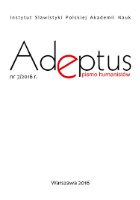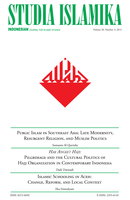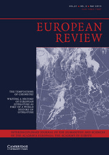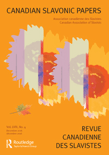
Comparative Southeast European Studies
Scope & Guideline
Advancing Knowledge through Comparative Perspectives on Southeast Europe
Introduction
Aims and Scopes
- Interdisciplinary Research:
The journal encourages a blend of disciplines such as anthropology, history, political science, and cultural studies, fostering comprehensive analyses of Southeast European societies. - Focus on Gender and Identity:
A significant area of interest is the exploration of gender dynamics, identity politics, and their interplay with national narratives, reflecting the socio-political fabric of the region. - Post-Conflict Studies:
The journal emphasizes research on the aftermath of conflicts in the Balkans, examining memory, trauma, and reconciliation processes, which are crucial for understanding contemporary issues. - Cultural and Historical Memory:
It engages with the politics of memory and historical narratives, particularly how these influence current identities and social cohesion in post-Yugoslav states. - Digital Humanities:
The journal embraces digital methodologies for analyzing historical texts and contemporary social phenomena, showcasing innovative approaches to traditional research themes.
Trending and Emerging
- Digital Activism and Memory:
There is a notable rise in research addressing the role of digital platforms in shaping collective memory and activism, particularly in post-conflict contexts. - Health and Societal Responses to Crises:
The impact of the COVID-19 pandemic on healthcare systems and societal behaviors has become a key focus, exploring the intersection of public health, policy, and community dynamics. - Gender Politics in EU Integration:
Emerging themes around gender politics, particularly how they intersect with EU accession processes, indicate a growing interest in how gender issues influence broader political landscapes. - Environmental and Energy Studies:
Research on environmental issues and energy security, particularly in the context of geopolitical tensions, has gained traction, reflecting global concerns over sustainability and resource management. - Migration and Diaspora Dynamics:
The journal is increasingly publishing works that examine migration patterns and the experiences of diasporas from Southeast Europe, addressing both historical contexts and contemporary challenges.
Declining or Waning
- Traditional Nationalism Studies:
Research focusing solely on nationalism as a singular theme has seen a decrease, as scholars now often approach nationalism in conjunction with other factors like globalization and transnationalism. - Cold War Era Analyses:
Studies centered on the Cold War period are less frequent, as contemporary issues and recent historical events take precedence over earlier geopolitical dynamics. - Economic Analyses of Statehood:
While economic topics remain relevant, the focus on rigid economic statehood narratives has diminished, giving way to more nuanced discussions around social impacts and individual experiences.
Similar Journals

JATI-Journal of Southeast Asian Studies
Empowering Research Beyond Borders in Southeast AsiaJATI-Journal of Southeast Asian Studies is a renowned academic journal published by the University of Malaya, specifically through the Department of Southeast Asian Studies, within the Faculty of Arts & Social Sciences. This journal serves as a vital platform for researchers, scholars, and students dedicated to the comprehensive exploration of Southeast Asian cultures, politics, economics, and social dynamics. As an open access publication, JATI promotes the dissemination of knowledge to a global audience, ensuring that valuable research reaches beyond conventional academic boundaries. With its commitment to advancing interdisciplinary perspectives and providing rigorous scholarly contributions, JATI is instrumental in shaping the discourse on Southeast Asia, making it an essential resource for anyone engaged in the study or application of Southeast Asian studies.

Adeptus
Connecting Scholars, Cultures, and Ideas in Slavic ResearchAdeptus is a pioneering open-access journal published by the Polish Academy of Sciences, Institute of Slavic Studies, specializing in Slavic studies and cultural research. Since its inception in 2014, the journal has aimed to foster scholarly dialogue and advance knowledge across various disciplines related to Slavic languages, literature, history, and sociology. With an ISSN of 2300-0783, Adeptus has positioned itself as a vital resource for researchers, professionals, and students engaged in Slavic studies, offering a platform for high-quality, peer-reviewed articles that explore diverse topics within the field. The journal's open-access model promotes accessibility and dissemination of knowledge, making it a significant contributor to the academic landscape. Located in Warsaw, Poland, Adeptus continues to thrive as a key outlet for innovative research, inviting submissions that embody rigorous scholarship and insightful perspectives.

Studia Islamika
Illuminating the intersections of faith, society, and scholarship.Studia Islamika is a distinguished academic journal published by the Syarif Hidayatullah State Islamic University Jakarta, specifically through the Center for Study Islamic & Society. Established in 1994, this journal has rapidly evolved to become a pivotal platform for advancing scholarly dialogue in the field of Islamic Studies. With a notable impact factor and categorized in the prestigious Q2 quartile of Religious Studies as of 2023, it emphasizes the critical examination of Islamic thought, culture, and sociopolitical contexts. The journal's issues span from 1994 to present, featuring innovative research that engages with contemporary challenges in Muslim societies. Although it does not currently offer open access, its rigorous peer-review process ensures high-quality research contributions. Researchers, professionals, and students alike will find Studia Islamika to be an invaluable resource for enhancing their understanding of the multifaceted dynamics within Islamic traditions and their implications in today's world.

TIJDSCHRIFT VOOR GESCHIEDENIS
Exploring the Depths of HistoryTIJDSCHRIFT VOOR GESCHIEDENIS is a prestigious academic journal published by WOLTERS-NOORDHOFF B V, dedicated to the field of history. With its ISSN 0040-7518 and an established reputation in the Netherlands, this journal serves as a vital platform for researchers, professionals, and students to disseminate and engage with significant historical scholarship. The journal's impactful contributions have earned it a commendable Q2 category ranking in the history field for 2023, placing it in the top tier of history journals according to Scopus. Although not open access, TIJDSCHRIFT VOOR GESCHIEDENIS offers invaluable insights into various historical topics spanning from its converged years starting in 1983 through to 2024. This enduring commitment to scholarly excellence fosters robust academic discourse and acts as an essential resource for those engaged in historical studies.

European Judaism-A Journal for the New Europe
Fostering Interdisciplinary Dialogue on Jewish IdentityEuropean Judaism - A Journal for the New Europe, published by Berghahn Journals, serves as a pivotal platform for scholarly dialogue within the realms of Religion, History, Psychology, and Cultural Studies, particularly focused on the contemporary Jewish experience. With its ISSN 0014-3006 and e-ISSN 1752-2323, this journal offers a robust examination of Judaism in the context of modern European society, aiming to bridge traditional scholarship and current cultural phenomena. The journal has a palpable impact within its diverse categories, reflecting a Q4 ranking in Applied Psychology, Cultural Studies, and Philosophy, a Q3 in History, and noteworthy engagement in Religious Studies as of 2023. While currently not adopting an open-access model, it remains an essential resource for researchers and academics seeking to contribute to ongoing discussions about Jewish identity and thought within the European context, emphasizing the journal's objectives of fostering informed interdisciplinary research. Situated in the United States, at 20 Jay St, Suite 512, Brooklyn, NY 11201, European Judaism continues to explore vital themes relevant to both the past and future of Jewish scholarship, making it a critical addition to any academic library.

Contemporary Southeast Asia
Advancing Understanding of Southeast Asia's ComplexitiesContemporary Southeast Asia is a leading academic journal published by the Institute of Southeast Asian Studies (ISEAS), Singapore, offering insightful analyses and discussions on the dynamic socio-political landscape of Southeast Asia. With an ISSN of 0129-797X and an E-ISSN of 1793-284X, this journal has been a significant contributor to the fields of Development, History, Political Science, and Sociology since its inception in 1979, and it continues to shape discourse through its robust publication record extending into 2024. The journal holds prestigious rankings, including Q2 in Development and Political Science, Q1 in History, and Q2 in Sociology, reflecting its rigorous scholarship and impact in the academic community. Researchers, professionals, and students will find valuable resources within its articles that address critical issues pertinent to the region, fostering a deeper understanding of Southeast Asia’s role in global contexts. Although the journal currently does not provide Open Access options, its contributions remain invaluable to those engaged in the study of this vibrant and diverse area.

Hungarian Cultural Studies
Fostering Inclusive Dialogue on Hungarian HeritageHungarian Cultural Studies, an influential journal published by the University of Pittsburgh Library System, explores the rich tapestry of Hungarian culture through an interdisciplinary lens. This open-access journal, established in 2008, aims to make scholarly research accessible and engaging for researchers, professionals, and students alike, fostering a deeper understanding of Hungary's diverse cultural narratives. With its commitment to high-quality research and inclusive dialogue, Hungarian Cultural Studies serves as a vital platform for new findings and discussions, enriching the academic landscape surrounding Central and Eastern European studies. By focusing on both historical and contemporary issues, this journal not only contributes to the field but also promotes cultural awareness and appreciation. For those interested in delving into the complexities of Hungarian culture, this journal is an essential resource.

European Review
Fostering Interdisciplinary Dialogue for a Changing WorldThe European Review, published by Cambridge University Press, serves as a vital platform for scholarly discourse in the fields of Geography, Planning and Development as well as Political Science and International Relations. Since its inception in 1993, this journal has contributed significantly to the academic community, providing a comprehensive review of pivotal issues and emerging trends across Europe and beyond. With an impressive H-Index and ranking in the Q3 category for both Geography and Political Science as of 2023, the European Review is highly regarded among researchers and practitioners interested in interdisciplinary methodologies and innovative research approaches. Although it is not an open-access publication, it offers subscribers access to a wealth of meticulously peer-reviewed articles, making it indispensable for those striving to keep abreast of the latest developments in these dynamic fields. The journal's commitment to fostering knowledge exchange ensures its importance as a resource for students, professionals, and researchers alike.

ACTA POLONIAE HISTORICA
Contributing to the Legacy of Scholarly Discourse in PolandACTA POLONIAE HISTORICA is a distinguished academic journal dedicated to the exploration and analysis of historical phenomena, cultural developments, and sociopolitical dynamics. Published by the Institute of History - Polish Academy of Sciences in Poland since its inception in 1968, this journal has established itself as a critical forum for scholarly discourse, encompassing various interdisciplinary fields including Cultural Studies, Gender Studies, History, and Sociology and Political Science. With its wide-ranging scope, ACTA POLONIAE HISTORICA invites researchers, professionals, and students to delve into the complexities of history and contemporary societal issues. Although it currently holds a Q4 ranking in multiple categories, this journal remains committed to fostering innovative research and yielding insights that contribute to the academic community. Its rigorous editorial standards ensure the dissemination of quality scholarship, essential for anyone engaged in serious historical and cultural studies.

Canadian Slavonic Papers
Unveiling Cultural Narratives from the Slavic WorldCanadian Slavonic Papers, published by Routledge Journals, Taylor & Francis Ltd, is an esteemed peer-reviewed journal dedicated to the exploration of the Slavic, Eastern European, and Russian domains, fostering scholarly dialogue across multiple disciplines. With a robust focus on Cultural Studies, History, Linguistics, and Literature, this journal has firmly established its presence in the academic community, as evidenced by its Q1 ranking across various categories in 2023. Since its inception, Canadian Slavonic Papers has been a vital platform for researchers, professionals, and students alike, providing an invaluable repository of knowledge and insights from 1977 to the present. While not an open-access journal, it remains accessible through institutional subscriptions, ensuring a wide dissemination of scholarship. Located in the United Kingdom, the journal continues to contribute significantly to the understanding of Slavic studies within a global context, making it essential reading for anyone invested in this dynamic field.